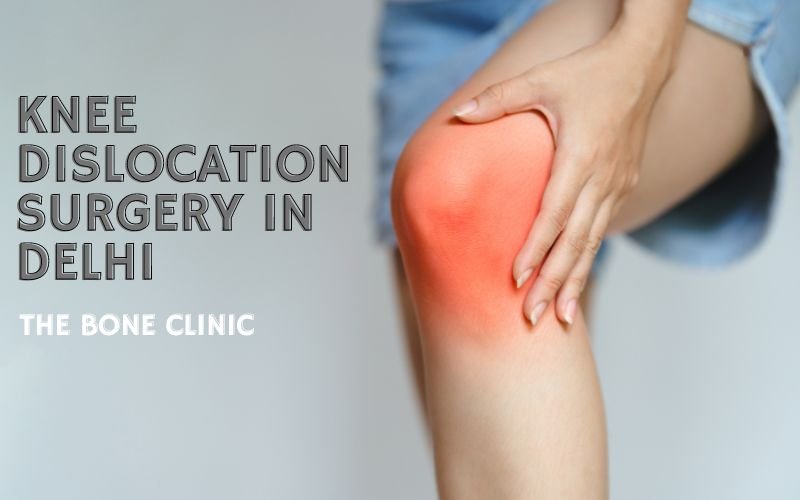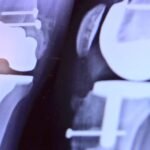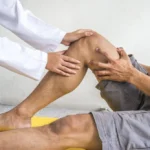Knee dislocation is a severe orthopedic injury that occurs when the bones of the knee joint become displaced from their normal alignment. This condition results from high-energy impluse traumas, such as vehicle accidents, sports injuries, or falls from heights. Knee dislocations causes miserable pain, instability, and functional damage. In such cases, Knee surgery is necessary to restore joint stability and prevent long-term problems.
Knee dislocation occurs when the femur (thigh bone) and tibia (shin bone) lose contact with each other, causing the misalignment of the knee joint. This displacement involve combinations of ligamentous injuries, including tears or ruptures of the anterior cruciate ligament (ACL), posterior cruciate ligament (PCL), medial collateral ligament (MCL), and lateral collateral ligament (LCL). The nearby soft tissues, blood vessels, and nerves got damaged, further worsening the injury.
The common causes of knee dislocation include:
The most common cause of knee dislocation is a traumatic event, such as a car accident, sports injury, or fall from a height. These high-energy impacts can forcefully push or twist the knee joint beyond its normal range of motion, causing the bones to dislocate.
Activities that involve rapid changes in direction, jumping, or collisions, such as football, basketball, soccer, and skiing, causes knee dislocation. Athletes experience knee dislocation when they land awkwardly or collide with another player.
Severe tears of the ligaments surrounding the knee, such as the anterior cruciate ligament (ACL), posterior cruciate ligament (PCL), medial collateral ligament (MCL), or lateral collateral ligament (LCL), can destabilise the joint and predispose it to dislocation.
Connective tissue disorders, such as Ehlers-Danlos syndrome or Marfan syndrome, weaken the ligaments and cause joint dislocations, including the knee.
Chronic degeneration of the knee joint due to osteoarthritis weaken the supporting structures, making the knee more susceptible to dislocation, especially with trauma or sudden movements.
Popular sports personalities like Rishabh Pant, Shane Bone, Robert Griffin III have faced knee dislocation injuries and have recovered with the help of good orthopedic treatment
Knee Dislocation Surgery in Delhi
Surgery of knee dislocation is used to restore joint alignment, repair damaged ligaments and soft tissues, and functional recovery. The surgery depends on the severity of the dislocation injury, ligamentous damage, and patient personal health status factors. Common surgery include:
- Closed Reduction and Immobilization: For acute knee dislocation without ligamentous injury or neurovascular compromise, closed reduction is performed. This involves manually realigning the bones of the knee joint followed by immobilisation in a brace or splint to allow repairing. However, this is used for less severe dislocations and not be sufficient for restoring joint stability in more complex cases.
- Ligament Repair or Reconstruction: For knee dislocations associated with ligamentous tears or ruptures, surgical repair or reconstruction of the damaged ligaments is necessary. This often involves using autografts or allografts (donor tissue) to reconstruct the ACL, PCL, MCL, or LCL. These procedures aim to restore joint stability, prevent recurrent dislocations, and facilitate the return to normal activities.
- Surgical Fixation of Fractures: In cases where knee dislocation is accompanied by fractures of the femur, tibia, or patella, surgery fixation is required to stabilise the fractured bones. This involve the use of screws, plates, or rods to realign the fractured segments.
- Vascular and Neurological Repair: Severe knee dislocations can result in damage to blood vessels and nerves surrounding the knee joint, leading to compromised blood flow and sensory or motor deficits. In such cases, surgeons perform operations to repair damaged blood vessels, restore blood flow, and address nerve injuries to prevent long-term complications such as ischemia or neurologic dysfunction.
When orthopedicians recommend knee dislocation surgery?
Surgery for knee dislocation is suggested in cases where measures, such as closed reduction and immobilization, fail or when there is evidence of ligamentous injury, fracture, vascular compromise, or neurologic deficit. Additionally, surgery is also recommended for patients with recurrent knee instability or those who desire to return to high-demand activities such as sports or physically demanding occupations.
Knee dislocation is a severe orthopedic injury that requires surgery to restore joint functionality ligaments and soft tissues. Consulting a good orthopedic specialist doctor can help you get a proper guidance on treatment and cure.
The Bone Clinic is a orthopedic Hospital in Dwarka led by team under Dr.S Mahanta, who is called as one of the top ortho specialist in Delhi




